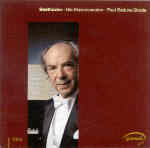Paul Badura-Skoda and the Beethoven sonatas have had a long discographical relationship since the 1950s. The pianist first recorded five “name” sonatas for Westminster (the “Moonlight”, Pathetique”, Appassionata”, “Pastoral”, and “Tempest”). He later undertook all 32 sonatas for an LP release brought out in the U.S. by the Musical Heritage Society to tie in with Beethoven’s 1970 bicentenary. More recently, he remade the cycle for Astrée, using period instruments. According to Badura-Skoda’s American management, the present 1969/70 recordings remained unedited and unreleased until now. In the main, they were worth the wait.
Badura-Skoda utilizes a Bösendorfer concert grand, whose pingy, registrally differentiated timbre presents a modern counterpart to the fortepiano. This proves particularly effective in works where Beethoven’s pedal markings ordinarily sound controversial to modern ears (the “Waldstein” sonata finale, the “Tempest” sonata’s opening recitative). What counts most, however, is the pianist’s high level of accomplishment and keen sense of style. Like Wilhelm Kempff, Badura-Skoda displays particular affection for Beethoven’s lyrical side, as his lovingly nuanced treatments of the Op. 2 No. 2, Op. 26, Op. 22, the aforementioned “Pastoral”, Op. 78, Op. 110, Op. 101’s first movement, and the Op. 49 sonatas reveal.
The pianist convinces less when he breaks the rhythmic impetus and sense of line to linger over a modulation here, or a fleeting dissonance there. Surely the G major sonata’s first-movement second subject (Op. 31 No. 1) doesn’t need a new tempo for its minor-key contrast to make its effect felt. And there’s little brio or heroic thrust to substantiate the pianist’s overly picky “Waldstein”, Appassionata”, and “Les Adieux”. Yet he projects the Op. 111 sonata’s visionary poetry with some of his most assertive, dynamic playing on disc. If Badura-Skoda’s Beethoven cycle doesn’t quite match the individuality and profile of Arrau, Kempff, Schnabel, Frank, and Gulda (my favorite Beethoven cycles), those seeking a viable supplementary version might consider this set. The warm, close-up engineering has scarcely dated.
































